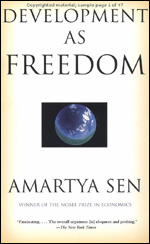 (Reprinted with permission from The Irish Times, written by John Mulqeen.)
(Reprinted with permission from The Irish Times, written by John Mulqeen.)
By focusing on the expansion of people’s freedom in the widest sense, Nobel prize-winner Amartya Sen distances himself from the pack. Not for him the identification of development with growth of GNP, or personal incomes, or industrialization. While these are important, for this economist, education, health care, social welfare, and political and civil rights are critical.
While we might be used to taking this for granted in the West, the link between economic growth and individual rights is a hot issue in countries such as Russia, where Mafia bosses are not familiar with Adam Smith’s “established rules of behavior.” It is not that Sen has something against the market—on the contrary. But his vision is global, and he sees the rejection of the freedom to enter the market as one way of keeping people in slavery (women in Afghanistan, for example).
He takes issue with the idea that authoritarian systems are good for rapid economic growth and says the evidence points in the opposite direction. Facing the electorate, he reminds us, gives a government a strong incentive to look after as many people as possible. This incentive for the ruling elite is absent in a non-democratic society, as those made destitute after the collapse of the Asian Tiger economies know.
He examines the social and cultural attitudes that inform public policy and looks at the famines of the 1840s in Ireland and the last famine in India, in Bengal, in 1943. Sen argues that cultural alienation and lack of political incentive led to British non-action in Ireland. Blame the colonial subject.
When we take today’s “us and them” factor into account—not unlike its ancestor in the 1840s—we can understand attitudes to famine victims today in Ethiopia, Somalia, and Sudan. He says famines are so easy to prevent, it is amazing they are allowed to occur at all.
Development As Freedom is intended to appeal beyond Amartya Sen’s usual academic audience and is an enjoyable, unusual, and important contribution to “the dismal science.”